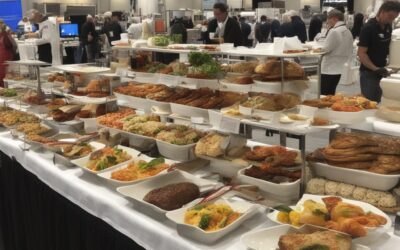Imagine a place where the winter frost dances with the fire’s warmth, where laughter rings out louder than the sizzling pancakes on the griddle, and where every face you see beams with joy and camaraderie. This is the Maslenitsa Pancake Festival, a week-long traditional Russian event that stitches together people from all walks of life. Each year, countless people gather around this delightful festivity to partake in the unique customs, creating a spectacle that significantly impacts Russia’s cultural landscape.
Despite its humble beginnings, the Maslenitsa Pancake Festival has blossomed into a significant cultural phenomenon that goes beyond just celebrating the end of winter. It has become an emblem of Russian heritage, showcasing the country’s rich traditions, folklore, and community spirit. The following sections delve deeper into the cultural impact of this remarkable event, painting a detailed picture of why it remains an integral part of Russia’s societal fabric.
The Maslenitsa Pancake Festival: A Symbol of Russian Heritage
The Maslenitsa Pancake Festival, locally known as “Maslenitsa,” is celebrated throughout Russia and some parts of Eastern Europe. Traditionally, it marks the end of winter and welcomes the spring season. Maslenitsa, meaning “Butter Week,” is the last week before the onset of the Great Lent in Orthodox Christianity, a time when dairy products are still permitted. The festival is organized by local authorities, churches, and community groups, and is open to everyone, regardless of their religion or nationality. To attend the festival, no tickets or registrations are required. You simply have to make your way to the festival grounds and join the celebrations.
The pancakes, or “blini,” are the star of the show, symbolizing the sun and the approaching spring. Drizzled in butter or filled with various sweet and savory fillings, these pancakes represent the warmth and joy of the festival. They are shared among friends, family, and strangers, fostering a sense of unity and hospitality, which are core Russian values.
The festival is not merely about feasting on pancakes. It’s a vibrant display of traditional Russian music, dance, and games, with the burning of the Maslenitsa straw effigy as the highlight of the festival, signifying the farewell to winter.
The Pancake: An Edible Symbol of Unity and Renewal
The pancake, or “blini,” plays a fundamental role in the Maslenitsa Pancake Festival. Traditionally made from rich ingredients allowed during the week before Lent – butter, eggs, and milk – the pancakes symbolize the sun’s warmth, alluding to the advent of spring. But beyond its culinary and symbolic value, the pancake is a medium of unity, bringing people together and strengthening communal bonds.
The act of cooking and sharing pancakes is a common tradition, inviting neighbors, friends, and strangers to sit together, enjoy the food, and partake in merry conversation. It’s not just about eating but sharing stories, creating memories, and building relationships. This communal aspect of sharing food, especially during a festive occasion, is a cornerstone of Russian culture, reinforcing the bonds between individuals and their communities.
The pancake’s symbolic significance as a symbol of renewal and its role in nurturing community bonds emphasizes the Maslenitsa Pancake Festival’s cultural impact. It is a testament to the festival’s power to transcend simple culinary traditions and foster a sense of unity and shared identity among participants.
The Effigy Burning: A Symbol of Rebirth and Purification
One of the Maslenitsa Pancake Festival’s most visually striking rituals is the burning of the Maslenitsa effigy, a straw figure often dressed in women’s clothing. This effigy, also known as “Lady Maslenitsa,” is burnt on the last day of the festival, symbolizing the end of winter and the rebirth of spring. This ceremony holds a significant place in Russian culture, drawing from ancient Slavic traditions of ritual purification through fire.
The burning effigy symbolizes the release of old grudges, regrets, and any negativity accumulated over the year. It allows people to embrace the coming spring with a purified spirit and renewed hope. This ritual provides a physical and metaphorical space for people to let go of their past and look forward to a new beginning, reinforcing the idea of personal and societal renewal.
Moreover, the ritual engages the community in a shared act of symbolic purification. It brings together families, friends, and strangers in a powerful display of communal unity and shared hopes, further solidifying the Maslenitsa Pancake Festival’s cultural impact.
Maslenitsa: A Celebration of Russian Folklore and Traditional Arts
One cannot talk about the cultural impact of the Maslenitsa Pancake Festival without acknowledging its role in preserving and promoting Russian folklore and traditional arts. As an event rooted in deep-seated traditions, it offers a vibrant stage for traditional music, dances, costumes, and games. Participants often dress in traditional attire, adding a splash of color and authenticity to the festive atmosphere.
The festival features folk music performances, with musicians playing traditional instruments like the balalaika and the gusli. Folk dances, such as the “khorovod,” a circular dance, are a common sight, inviting everyone to join in and share in the merriment. The games include “luchina,” a game similar to bowling, and “gusli,” a tag-like game, both of which are a testament to Russia’s rich folk heritage.
By providing a platform for these traditional art forms, the festival ensures their continuity and preservation. It allows younger generations to connect with their heritage, ensuring that these traditions remain alive and continue to be an integral part of Russia’s cultural identity.
Maslenitsa: A Reflection of Russian Spirituality and Religious Traditions
Although the Maslenitsa Pancake Festival has its roots in pagan traditions, it is also closely associated with Orthodox Christianity in Russia. The festival takes place during the last week before the Great Lent, a significant period in the Orthodox Christian calendar. This week, called “Cheese Week,” is the last opportunity to enjoy dairy products, including the symbolic pancakes, before the fasting period begins.
Religious ceremonies such as church services, prayers, and processions are often held during the festival. These practices offer a chance for participants to reflect on their spiritual beliefs and prepare for the Lenten season. While the festival is a joyful event, it also provides a space for introspection and spiritual renewal, reflecting the deep-rooted religious traditions in Russian culture.
However, the festival’s inclusivity is noteworthy. Regardless of one’s religious beliefs or background, everyone is welcome to participate in the festivities. This openness echoes the Russian spirit of hospitality and reflects the country’s diverse and inclusive cultural fabric.
Maslenitsa and Its Impact on Russian Tourism
The Maslenitsa Pancake Festival has significantly impacted Russian tourism. Every year, the festival attracts a large number of domestic and international tourists who come to experience this unique cultural extravaganza. The festival is held across various cities and towns in Russia, turning these places into vibrant tourist hubs during the week-long celebration.
The increase in tourism not only boosts the local economy but also promotes cultural exchange. Visitors get a chance to immerse themselves in Russian culture, learn about traditions and customs, and engage with locals. On the other hand, locals get to share their culture, traditions, and hospitality with a global audience.
Furthermore, the festival offers a unique selling proposition for Russian tourism. The promise of experiencing a traditional Russian festival, filled with music, dance, games, food, and communal spirit, provides a compelling reason for tourists to visit Russia during the Maslenitsa celebrations.
The Power of Community: Unifying People through the Maslenitsa Pancake Festival
The cultural impact of the Maslenitsa Pancake Festival extends beyond its rich traditions and celebrations. At its core, it’s a festival that unites people. It brings together individuals from different backgrounds, professions, and ages to engage in a collective celebration of Russian culture and the onset of spring. Whether through sharing pancakes, dancing together, or participating in traditional games, the festival offers numerous opportunities for people to interact, form connections, and reinforce community ties.
This power to unify people is especially crucial in today’s increasingly individualistic society. The festival offers a much-needed respite, providing a platform for people to reconnect with their community. It cultivates a sense of belonging, reinforcing the idea that despite our differences, we share common cultural roots and traditions that bind us together. This sense of unity and community spirit significantly contributes to the festival’s cultural importance.
Maslenitsa: Promoting Sustainability and Local Produce
The Maslenitsa Pancake Festival also plays a significant role in promoting sustainability and the use of local produce. The pancakes, being the centerpiece of the festival, are traditionally made from locally sourced ingredients such as butter, milk, and eggs. This practice supports local farmers and promotes the consumption of fresh, seasonal produce, thereby encouraging sustainable farming practices.
Moreover, the festival promotes sustainability by focusing on traditional games and entertainment forms that require minimal use of resources. These include activities like snowball fights, sledding, and horse-drawn sledge rides, which leverage the natural winter landscape, and traditional games that require little more than human participation.
By promoting local produce and sustainable entertainment, the Maslenitsa Pancake Festival contributes to the preservation of the environment and supports the local economy, further enhancing its cultural significance.
An Opportunity for Cultural Education: Learning and Teaching through the Festival
The Maslenitsa Pancake Festival serves as a living classroom for both children and adults. It offers a fun, engaging, and immersive way to learn about Russian history, folklore, traditions, and customs. The stories behind each tradition, the significance of the rituals, the traditional games, dances, and music – each aspect of the festival provides an opportunity for cultural education.
For the younger generation, the festival is an effective means of connecting with their cultural roots, promoting a sense of pride and identity. For adults, it provides a chance to pass down traditions and knowledge to the younger ones, ensuring the continuation of these customs. For visitors and foreigners, it’s an opportunity to learn about and appreciate the richness of Russian culture.
By fostering learning and cultural continuity, the Maslenitsa Pancake Festival significantly contributes to Russia’s cultural landscape.
Maslenitsa: A Celebration of Life and Joy
Finally, the Maslenitsa Pancake Festival, with all its rituals, games, music, and pancakes, is ultimately a celebration of life and joy. It serves as a reminder to take pleasure in simple things, to appreciate the changing seasons, to value community and shared traditions. It embodies the Russian spirit of resilience and optimism, turning the harsh winter’s end into a cause for celebration and joy.
Through its festivities, the festival encourages individuals to take a break from their daily routines, to laugh, dance, sing, play, and simply enjoy the moment. It cultivates an atmosphere of positivity and happiness, which can have a significant positive impact on individuals’ mental well-being.
This celebration of life and joy, the feeling of collective happiness and unity, is perhaps the most profound cultural impact of the Maslenitsa Pancake Festival. It demonstrates that despite the challenges and hardships, there is always a reason to celebrate and find joy, thereby enriching the cultural ethos of Russia.
There you have it! An in-depth exploration of the cultural impact of Russia’s Maslenitsa Pancake Festival. Through its traditions, rituals, community spirit, and celebratory atmosphere, the festival significantly contributes to Russia’s cultural fabric. It’s not just a festival – it’s a symbol of Russian heritage, a celebration of community and life, and an enriching cultural experience. So, why not be a part of the next Maslenitsa Pancake Festival and experience the cultural marvel firsthand?
We welcome any suggestions or questions. You can email us or contact us using the contact page.
You can also connect with us on the following social networks:









0 Comments